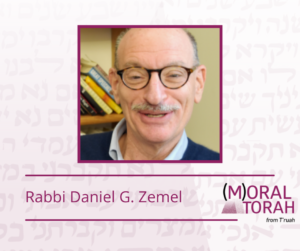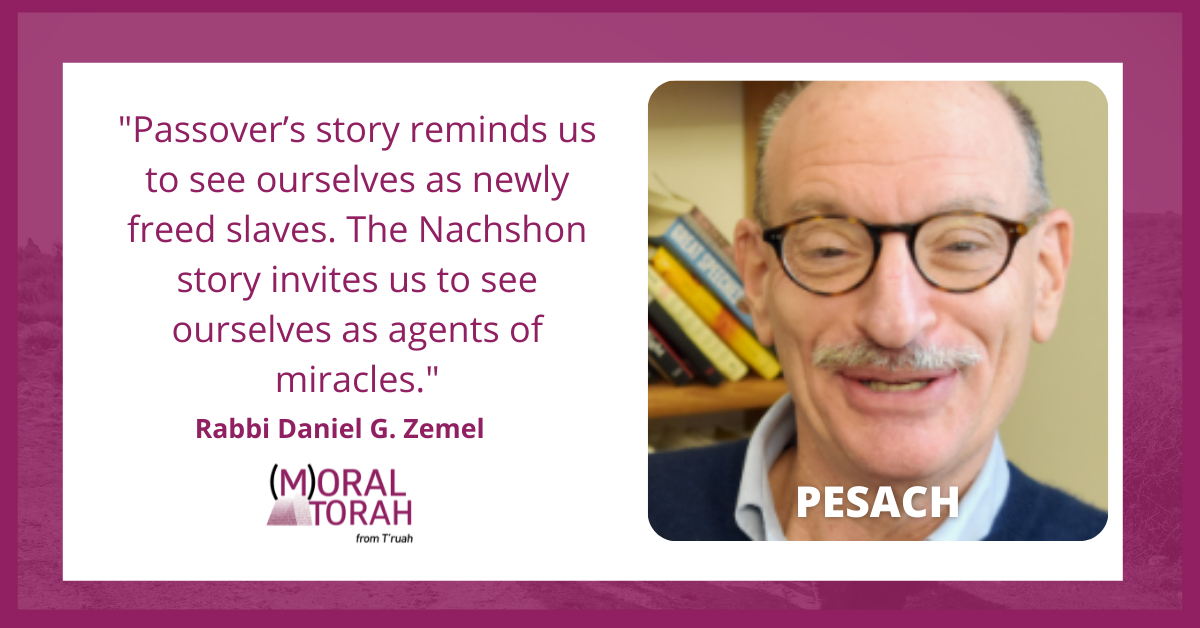A D’var Torah for Pesach by Rabbi Daniel G. Zemel
In The Lincoln Highway, Amor Towles writes:
If I learned anything in the war, it’s that the point of utter abandonment — that moment at which you realize no one will be coming to your aid, not even your Maker — is the very moment in which you discover the strength to carry on. The Good Lord does not call you to your feet with hymns from the cherubim and Gabriel blowing his horn. He calls you to your feet by making you feel alone and forgotten. For only when you see that you are truly forsaken will you embrace the fact that what happens next rests in your hands, and your hands alone.
I read those words in this sensitively written, quixotic odyssey of a novel and thought immediately of our minor biblical figure but aggadic superstar, Nachshon. Who does not know and love that midrashic enhancement? Rabbinic literature elevates Nachshon and casts him as the hero at the crossing of the sea. The midrashic enhancement compels us. It begs us to imagine this everyman turned hero wading into the sea with everyone looking on. What are they thinking? What is he doing? What will he do when the water gets over his head? As Moses prays, Nachshon wades ever deeper until the point that his very life is at risk, as the Mekhilta (Masecheta d’Vayehi Beshalach, Parsha 5) quotes Psalm 69, “ad nefesh.” With the power to save a life, the waters part.
Sign up to receive (M)oral Torah in your inbox each week.
Nachshon makes it and, with him, all Israel. Moses can rest his outstretched arms and put his magic staff away.
I have often wondered about the creator(s) of the Nachshon legend. What were they thinking? Did the Torah story, on its own, disturb them in some way? Did they doubt its veracity? Why Nachshon?
Each year, as I sit at my Seder table, I silently consider these questions. I have come to think that the crafters of the Nachshon legend were dissatisfied with the Torah’s story as they read it because it was not true to their own experience. No waters had ever magically parted for them. No sea had ever opened up. A safe way forward had never mysteriously appeared when they themselves experienced threat, danger, disease, or any kind of trouble.
For the crafters of the Exodus drama, miracles were the vehicle of faith. With the Nachshon story, we see that among their later followers, there were devoted students of Torah who sought more human engagement with life’s great hurdles. The Nachshon midrash was their response. Nachshon, like the character Ulysses in Amor Towles’ novel, knows that at the point of “utter abandonment” we must take matters into our own hands. These are acts of faith. Those ancient rabbinic interpreters of the text do not eliminate the miracle of parting the waters from the story. They boldly add a human element, as if to say: “This is the way God acts in the world!” They were able to see their hands as the hands of God and write themselves into the story. That lesson is ours to hold today.
Find more commentaries on Pesach.
Archimedes is said to have proclaimed, “Give me a lever and a place to stand and I can move the world.” What applies for Archimedes’ math applies for at least this strand of rabbinic theology. When we separate Jewish social action from Jewish learning, prayer, text, and faith, we are relinquishing our lever. Our reservoir of strength is the inheritance of our past.
 This Passover, as you gather at your Seder table, synagogue, chavurah, Hillel, study group or simply mingle with friends, discuss what miracle you want to create in the world and chart for yourself a path like Nachshon.
This Passover, as you gather at your Seder table, synagogue, chavurah, Hillel, study group or simply mingle with friends, discuss what miracle you want to create in the world and chart for yourself a path like Nachshon.
T’ruah’s t-shirt reminds us that when we protest, march, advocate, sing, pray, stand, petition, or shout, we do so as the holders of a great and durable lever that has changed history.
Passover’s story reminds us to see ourselves as newly freed slaves. The Nachshon story invites us to see ourselves as agents of miracles. In other words, don’t wait for miracles — make them.
Rabbi Daniel G. Zemel is the senior rabbi of Temple Micah, Washington, DC, and a member of the T’ruah board. He loves playing with his grandchildren.

